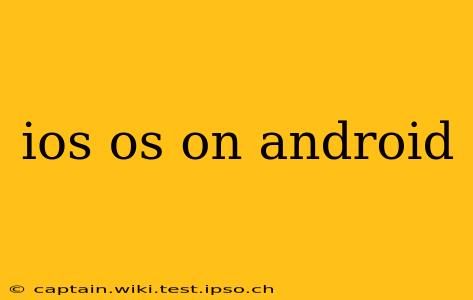The question of running iOS on Android is a fascinating one, sparking curiosity among tech enthusiasts and developers alike. While a direct, seamless port of iOS onto Android isn't possible, the desire to experience iOS features on an Android device has led to creative workarounds and explorations. This article dives into the current state of this endeavor, exploring the technical challenges, existing solutions (and their limitations), and future possibilities.
Can I Directly Install iOS on My Android Phone?
No, you cannot directly install iOS on an Android phone. The two operating systems are fundamentally different. iOS is built for Apple's hardware architecture (ARM-based processors designed specifically for Apple devices), while Android is designed to run on a wide range of ARM-based processors from various manufacturers. The core code, drivers, and system components are incompatible. Attempting to force an installation would likely result in a bricked device.
Are There Any Apps That Mimic the iOS Experience?
Several apps attempt to mimic the visual aesthetics of iOS. These launchers often replicate the home screen layout, widgets, and icon designs. However, these are purely cosmetic changes. The underlying operating system remains Android, and crucial iOS features like iMessage, FaceTime, and the App Store are unavailable. These apps offer a superficial resemblance but lack the core functionality of iOS.
What About iOS Emulators for Android?
While iOS emulators exist for computers (like macOS), running a full iOS emulator on an Android device is highly unlikely due to the significant resource requirements and the fundamental incompatibility between the operating systems. Even on powerful computers, emulating iOS can be resource-intensive. The processing power and memory limitations of most Android devices would make running a functional iOS emulator extremely difficult, if not impossible.
Could I Use a Virtual Machine to Run iOS on Android?
Similar to emulators, virtual machines (VMs) require considerable processing power and RAM to operate effectively. Running a VM capable of hosting iOS on an Android device is presently not feasible for the average user. The resource demands would severely impact the performance of the Android device itself, rendering it practically unusable.
What are the Technical Hurdles to Running iOS on Android?
The core technical challenges are significant:
- Kernel incompatibility: The Linux kernel underpinning Android is fundamentally different from the Darwin kernel used by iOS. This difference necessitates a complete rewrite of the iOS system to be compatible with the Android kernel, which is an enormous undertaking.
- Hardware drivers: iOS relies on specific hardware drivers optimized for Apple's hardware. These drivers are not compatible with the diverse hardware found in Android devices.
- Software architecture: The software architecture of iOS is vastly different from Android's. Adapting iOS to work with Android's architecture would require a massive engineering effort.
Is There Any Future Potential for iOS on Android?
While unlikely in the foreseeable future, theoretical possibilities exist. Significant advancements in cross-platform compatibility technologies or revolutionary virtualization techniques could theoretically bridge the gap. However, this remains in the realm of speculation, requiring substantial technological breakthroughs and a significant change in Apple's approach to its ecosystem.
In conclusion, running a fully functional iOS on an Android device is currently not possible and likely won't be in the near future due to significant technical hurdles. While apps exist to mimic the iOS look and feel, they don't provide the genuine iOS experience. The differences in architecture and software are substantial, and bridging this gap would require major advancements in technology.
